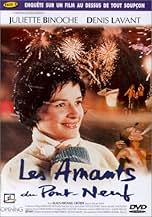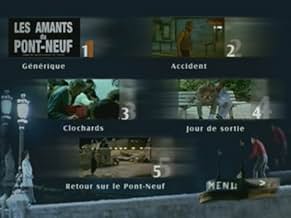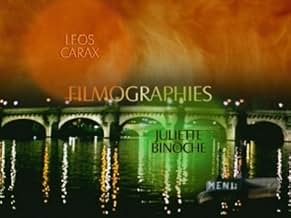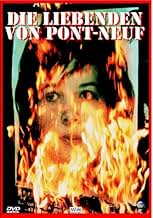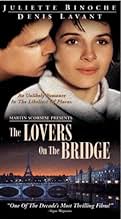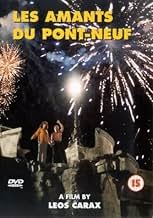AVALIAÇÃO DA IMDb
7,6/10
16 mil
SUA AVALIAÇÃO
Alex, sem-abrigo e viciado em álcool, e Michèle, que está a perder a visão, estabelecem uma relação enquanto dormem na ponte Pont-Neuf, em Paris.Alex, sem-abrigo e viciado em álcool, e Michèle, que está a perder a visão, estabelecem uma relação enquanto dormem na ponte Pont-Neuf, em Paris.Alex, sem-abrigo e viciado em álcool, e Michèle, que está a perder a visão, estabelecem uma relação enquanto dormem na ponte Pont-Neuf, em Paris.
- Indicado para 1 prêmio BAFTA
- 4 vitórias e 8 indicações no total
Chrichan Larsson
- Julien
- (as Chrichan Larson)
Avaliações em destaque
Obsession, addiction, violence and love. Sometimes all four at the same time. If nothing else, this movie is a complete roller-coaster ride through the emotions. It's hard to say whether it's really a love story. Is it love when you want to possess someone to the point where you would rather they go blind than go away? Is it love to want to drag someone down with you to bottom of your own degradation? Is it love when you would take someone's life because they wanted to go home? But then again, is it love when you allow all this to happen and still come back for more? I have my doubts.
This is really a story of obsession and possession between two people who find themselves marooned out on the edge of human existence. They find something like tenderness, something like love by holding on to each other like two children lost in the dark woods. But obsession is ultimately destructive and so it is here. Alex wants Michelle but never really shows any real tenderness. He has nothing to offer except cheap wine and an old overcoat. He is destructive, violent and child-like. The relationship between Alex and Michelle is quite impossible to comprehend sometimes. What this movie does have is passion. But this is real life passion. Real and raw. If you ever see real people like Alex and Michelle, and they do exist, you can see how they cling to each other, how they abuse each other, how they are possessed by their lifestyle, unable or unwilling to fight their way out of their humiliation. So in the end they just drag each further down, drowning in hopelessness.
But just as you think the story is going to end in tragedy...well you have to watch it for yourself.
The cinematography in this movie is breathtaking at times, but in a very unconventional way. It is beautiful to watch even though there is precious little that is attractive. Paris looks by turns both shiny and exciting and then dark, grey and filthy. Which, if you've been there, you will know is exactly how it is. There is not a single shot of any famous Parisian landmark either. Only the river Seine and the bridges around Pont Neuf are part of the landscape in this story.
It's really an ensemble piece for two characters; two characters caught up in obsession, possession and some kind of love story. The two lead actors, Juliette Binoche and Dennis Levant produce performances of real emotional power and subtlety. There is nothing coming out of Hollywood to match movies like this, nor are there many actors, if any, who could get close to performances like these. One day the Academy will begin to recognise that acting and movies is not just about box office returns and bestow their awards on movies like this.
This is really a story of obsession and possession between two people who find themselves marooned out on the edge of human existence. They find something like tenderness, something like love by holding on to each other like two children lost in the dark woods. But obsession is ultimately destructive and so it is here. Alex wants Michelle but never really shows any real tenderness. He has nothing to offer except cheap wine and an old overcoat. He is destructive, violent and child-like. The relationship between Alex and Michelle is quite impossible to comprehend sometimes. What this movie does have is passion. But this is real life passion. Real and raw. If you ever see real people like Alex and Michelle, and they do exist, you can see how they cling to each other, how they abuse each other, how they are possessed by their lifestyle, unable or unwilling to fight their way out of their humiliation. So in the end they just drag each further down, drowning in hopelessness.
But just as you think the story is going to end in tragedy...well you have to watch it for yourself.
The cinematography in this movie is breathtaking at times, but in a very unconventional way. It is beautiful to watch even though there is precious little that is attractive. Paris looks by turns both shiny and exciting and then dark, grey and filthy. Which, if you've been there, you will know is exactly how it is. There is not a single shot of any famous Parisian landmark either. Only the river Seine and the bridges around Pont Neuf are part of the landscape in this story.
It's really an ensemble piece for two characters; two characters caught up in obsession, possession and some kind of love story. The two lead actors, Juliette Binoche and Dennis Levant produce performances of real emotional power and subtlety. There is nothing coming out of Hollywood to match movies like this, nor are there many actors, if any, who could get close to performances like these. One day the Academy will begin to recognise that acting and movies is not just about box office returns and bestow their awards on movies like this.
This is one of the great romances precisely because it goes against the grain of all the great screen romances. Because of its ability to strike new terrain -- to go where no romance has gone before, to take chances, in essence -- it achieves a level of passionate intensity that most romantic films could only dream of mustering.
The camera work -- by Jean-Yves Escoffier, one of the great cinematographers working today (who shot Leos Carax's early films -- "Bad Blood" and "Boy Meets Girl" -- as well as Larry Clark's "Kids," and the directorial debut of Harmony Korine, "Gummo") -- is absolutely breathtaking. I cannot overemphasize this. It is, perhaps, one of the most beautiful color films ever made. The style of the film suits the subject matter perfectly. It proves that the great films have a form that not only compliments the subject matter, but becomes it. The content is the form, and vise versa. The film is shot "Cinema-Verite" style, with rough, hand-held, choppy camerawork, and a gritty, realistic aesthetic quality. There are moments of fancy and surrealism that would seem to utterly contradict this style. On the contrary, these moments are rendered believable, avoid presenting problems of logic, because of the film's harsh, balancing tone. The "wild" style of the film captures perfectly the passionate, stormy affair of the lovers -- the truest love, and certainly the most passionate, the film says, is that closest to nature, to the base element of humanity.
Another layer of enjoyment comes from the film's similarity to Jean Vigo's "L'Atlante." In fact, the final sequence in the film has the two lovers plummeting from the bridge into the cold water. They are picked up by a sand barge, on its final trip to the ocean. The husband and wife, who we learn have spent their life shipping sand, agree to take them along. It is almost as if the couple in "L'Atlante" have reappeared to prove that passionate, tumultuous love affairs can end happily, despite their problems. One of the last shots of the film shows the two lovers walking across the barge, over the hills of sand, to the bow -- a direct quotation of "L'Atlante."
The last shot (for enemies of James Cameron's "Titanic" -- an absolutely shallow romance; as cold and heartless as the iceberg that dooms the ship) shows the two lovers hovering over the bow of the ship, magically, as if suspended by love. It is obvious James Cameron plagiarized this moment ("Les Amants..." came out in 1991). This fact should be trumpeted far and wide. "Titanic" is a bloated whale of a movie. "Les Amants du Pont Neuf" is simply the greatest romance to have erupted on the screens in the last decade.
The camera work -- by Jean-Yves Escoffier, one of the great cinematographers working today (who shot Leos Carax's early films -- "Bad Blood" and "Boy Meets Girl" -- as well as Larry Clark's "Kids," and the directorial debut of Harmony Korine, "Gummo") -- is absolutely breathtaking. I cannot overemphasize this. It is, perhaps, one of the most beautiful color films ever made. The style of the film suits the subject matter perfectly. It proves that the great films have a form that not only compliments the subject matter, but becomes it. The content is the form, and vise versa. The film is shot "Cinema-Verite" style, with rough, hand-held, choppy camerawork, and a gritty, realistic aesthetic quality. There are moments of fancy and surrealism that would seem to utterly contradict this style. On the contrary, these moments are rendered believable, avoid presenting problems of logic, because of the film's harsh, balancing tone. The "wild" style of the film captures perfectly the passionate, stormy affair of the lovers -- the truest love, and certainly the most passionate, the film says, is that closest to nature, to the base element of humanity.
Another layer of enjoyment comes from the film's similarity to Jean Vigo's "L'Atlante." In fact, the final sequence in the film has the two lovers plummeting from the bridge into the cold water. They are picked up by a sand barge, on its final trip to the ocean. The husband and wife, who we learn have spent their life shipping sand, agree to take them along. It is almost as if the couple in "L'Atlante" have reappeared to prove that passionate, tumultuous love affairs can end happily, despite their problems. One of the last shots of the film shows the two lovers walking across the barge, over the hills of sand, to the bow -- a direct quotation of "L'Atlante."
The last shot (for enemies of James Cameron's "Titanic" -- an absolutely shallow romance; as cold and heartless as the iceberg that dooms the ship) shows the two lovers hovering over the bow of the ship, magically, as if suspended by love. It is obvious James Cameron plagiarized this moment ("Les Amants..." came out in 1991). This fact should be trumpeted far and wide. "Titanic" is a bloated whale of a movie. "Les Amants du Pont Neuf" is simply the greatest romance to have erupted on the screens in the last decade.
...but what style! The most expensive French film ever made when it came out, this film features some spectacular set-pieces, particularly the French bi-centennial celebrations that provide a backdrop. It has its weaknesses, but when I saw this in the cinema I was blown away. Denis Lavant puts in a particularly strong performance as Alex, the depressive and tender down-and-out obsessed with Binoche's Michele. Watch it, even if you find nothing else in it, the visuals are astonishing.
The Lovers on the Bridge boldly reminded me this is what cinema is all about. Strong performances, exceptional cinematography, and wonderfully creative direction highlight this truly "must see" movie. There are many scenes in this film which actually took my breath away and some of the music did the same. The story and characters are disturbingly brutal but that is offset by some amazing imagery. My highest recommendation!
Oh, please. I used to say I could watch Juliette Binoche read the phone book, but this sorely tested that theory. What a mess of a movie! -- by turns a tired liberal pseudodocumentary on the homeless (though by the end, you realize that according to this flick, homelessness is a byproduct of personal misfortune and not, evidently, any societal forces), a down-and-dirty romance (Binoche can be forgiven; what actress [or actor] wouldn't want to play a one-eyed homeless artist losing the vision in the other eye?), an extended music video, and God knows what else, all set in a Paris largely devoid of traffic and people. Completely lacking *internal* logic (and yes, fables do need that), it seems to have acquired quite a few devotees drawn to its alleged "poetry." All I see is pretentiousness and self-indulgence. If the other reviews here tempt you to see it anyway, that's fine; but don't say you weren't warned.
Você sabia?
- CuriosidadesLeos Carax was originally given permission to use the real Pont-Neuf bridge in Paris and have it closed for filming but delays in filming meant the permission expired and he had to reconstruct the whole thing on a lake near Montpellier, France. The construction of a new version of the Pont-Neuf - and its surrounding buildings in Paris - helped make the film one of the most expensive French films ever made.
- Erros de gravaçãoJust before Alex jumps out of the speedboat, a crew person is visible hunched down in ninja clothing to pilot the boat.
- Citações
Michèle Stalens: The people in our dreams, we should call them when we wake up. It would make life simpler. "Hello, I dreamed of you. Love woke me".
- Cenas durante ou pós-créditosAfter the last end title, during a fraction of a second, there is a handwritten inscription "à Luje - Amour - A." (To Luje - Love - A.) A. stands for Alexandre (Leos Carax' real first name) and Luje for Juliette (Binoche).
- ConexõesFeatured in Enquête sur un film au-dessus de tout soupçon (1991)
- Trilhas sonorasTime Will Crawl
Written and performed by David Bowie
Principais escolhas
Faça login para avaliar e ver a lista de recomendações personalizadas
- How long is The Lovers on the Bridge?Fornecido pela Alexa
Detalhes
- Data de lançamento
- País de origem
- Central de atendimento oficial
- Idioma
- Também conhecido como
- The Lovers on the Bridge
- Locações de filme
- Boulevard de Sebastopol, Paris, França(Car hits Lavant)
- Empresas de produção
- Consulte mais créditos da empresa na IMDbPro
Bilheteria
- Orçamento
- US$ 28.000.000 (estimativa)
- Faturamento bruto nos EUA e Canadá
- US$ 29.679
- Fim de semana de estreia nos EUA e Canadá
- US$ 21.482
- 4 de jul. de 1999
- Faturamento bruto mundial
- US$ 32.225
- Tempo de duração
- 2 h 5 min(125 min)
- Cor
- Proporção
- 1.66 : 1
Contribua para esta página
Sugerir uma alteração ou adicionar conteúdo ausente

![Assistir a Bande-annonce [OV]](https://m.media-amazon.com/images/M/MV5BY2Q3NmQ3MzctYTU4OC00ZjA5LTkzNDMtZWEzMjM2MzZmNGM0XkEyXkFqcGdeQXRyYW5zY29kZS13b3JrZmxvdw@@._V1_QL75_UX500_CR0)

